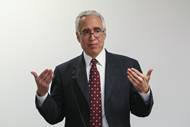American government was designed to be led by citizens who would step out of private life to serve their nation, then return to their communities enriched by that service and ready to recruit the next generation of citizen servants. The Founding Fathers understood that the quality of a president’s appointments was as important to the public’s confidence in government as the laws that its elected leaders would enact. “There is nothing I am so anxious about as good nominations,” Thomas Jefferson wrote at the dawn of his presidency in 1801, “conscious that the merit as well as reputation of an administration depends as much on that as on its measures.”
Two hundred years later, the Founders’ model of presidential service is near the breaking point. Not only is the path into presidential service getting longer and more tortuous, it leads to evermore stressful jobs. Those who survive the appointments process often enter office frustrated and fatigued, in part because they get little or no help, and in part because the process has increasingly become a source of confusion and embarrassment.
The evidence comes from a survey conducted for The Presidential Appointee Initiative, which is a project of the Brookings Institution funded by a grant from The Pew Charitable Trusts. The telephone survey of 435 senior-level appointees who served in the second Reagan, Bush, and Clinton administrations was co-sponsored by the Brookings Institution and Heritage Foundation, and was conducted by Princeton Survey Research Associates between December 1999 and February 2000. Because the sample was designed to produce roughly equal numbers of appointees per term, not administration, the Clinton administration supplied roughly half of all respondents. (The survey methodology is discussed in Appendix II of this report, and the survey results are presented in Appendix III).
The following report is not meant to be taken as the definitive analysis of the survey. That work will come from a team of scholars assembled from the nation’s leading policy institutes, including the Brookings Institution, Heritage Foundation, Baker Institute at Rice University, Bush Institute at Texas A & M University, and Dole Institute at the University of Kansas.
Rather, this report is designed to provide a broad assessment of the current state of the presidential appointments process. At least according to those who have experienced the frustrations firsthand as nominees, it is safe to conclude that the presidential appointments process now verges on complete collapse. Designed to recruit talented Americans for service, while making sure they are fit to serve, the process no longer does either job particularly well. Consider the following facts drawn from the survey:
DELAYS ARE INCREASING. More than half of the appointees confirmed between 1984 and 1999 waited five months or more to enter office, compared with just a sixth of the appointees who were confirmed between 1964 and 1984.
CONFUSION AND EMBARRASSMENT ARE ALSO INCREASING. Two-fifths of the Reagan, Bush, and Clinton appointees described the current process as confusing, and a quarter called it embarrassing. Half of the Clinton appointees described the process as confusing, compared with just a third of the Bush and Reagan appointees.
ALL STAGES OF THE PROCESS TAKE LONGER THAN NECESSARY. The Reagan, Bush, and Clinton appointees believe the process took longer than necessary at every turn, from the president’s personal approval of their nomination to Senate confirmation.
BOTH THE EXECUTIVE AND LEGISLATIVE BRANCHES HAVE CONTRIBUTED TO THE DELAYS. Nearly half of the appointees said that the Senate has made the process an ordeal, and almost a third said the same thing about the White House.
THE PROCESS FAVORS PEOPLE WITH PRIOR GOVERNMENT EXPERIENCE. Presidential appointees with no prior government experience knew less about the process going in, needed more help during the process, and entered office with less mastery of their jobs.
The following pages will examine these and other measures of the state of the presidential appointments process in five sections. The first section will ask what might make talented individuals want to be a presidential appointee, and will answer that the commitment to making a difference is still alive and well. The second section will ask how well the current process works in fulfilling its primary mission, and will answer that the process is failing on three different measures of effectiveness. The third section will look more closely at the causes of the crisis, looking first at the White House and Senate as a whole, then focusing more specifically on the financial disclosure process, the White House Office of Presidential Personnel, divided party control of government, and the peculiar problems of the Clinton administration. The fourth section will examine several possible consequences of the current crisis, most notably the narrowing of the talent pool. The fifth and final section will briefly examine suggested reforms in the process. (Appointee suggestions for reform are presented in Appendix I).



